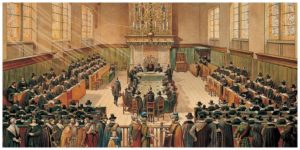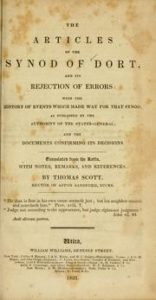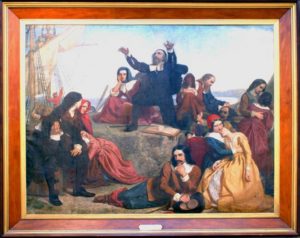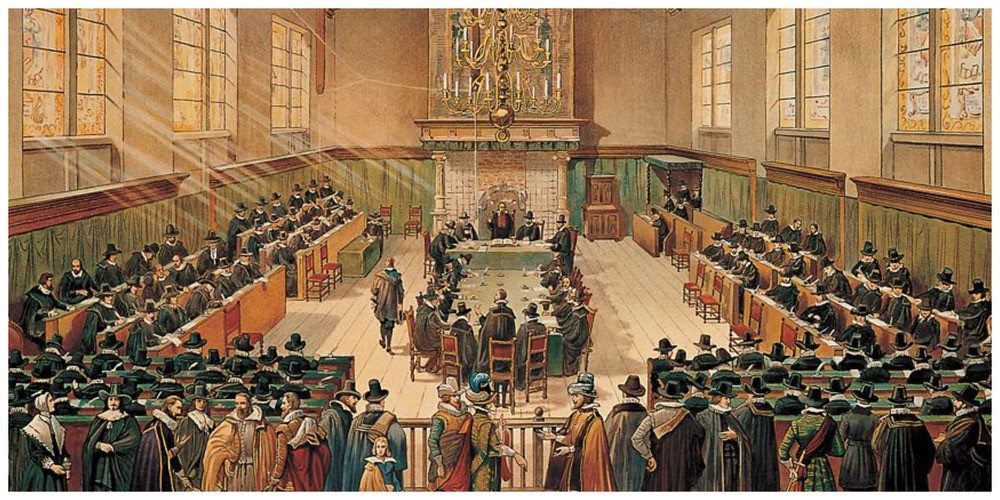During the time the Pilgrims were staying in Leyden a famous synod was called by the Dutch Reformed Church to settle a doctrinal dispute initiated by Jacob Arminius. Though Jacob had already died, his disciples presented their objections to the teachings of John Calvin. This challenge was called the Remonstrance of 1610. Those defending the Calvinist position of a) human depravity, b) election, c) atonement, d) grace, and e) falling from grace were called the Contra-Remonstrance. The synod took place in the Netherlands from November 13, 1618 to May 9, 1619 in Dordrecht (Dort), Holland. Today we might hardly notice such a gathering, but in the early 17th century, theological differences and their consequences were taken quite seriously.
 The purpose of a synod was to settle doctrinal controversy within the church to preserve unity. The fact that there were twenty-six delegates from eight foreign countries meant the decisions held international weight. Throughout church history, the inevitable challenge of doctrinal confusion has been the catalyst by which creeds (and doctrinal unity) have been established. Open debate has been critical to the advance of Christianity to the degree that the Bible has been consulted as authoritative. Believers today need to understand the role of theology in the 17th century. Civil government was assumed to be the one to enforce church doctrine, and it was out of this context that the Pilgrims “separated.” Their separation, however, occurred by degrees. Though Robinson agreed with Calvinism, the Synod of Dort may have been a catalyst to show him the necessary limits of civil authority.
The purpose of a synod was to settle doctrinal controversy within the church to preserve unity. The fact that there were twenty-six delegates from eight foreign countries meant the decisions held international weight. Throughout church history, the inevitable challenge of doctrinal confusion has been the catalyst by which creeds (and doctrinal unity) have been established. Open debate has been critical to the advance of Christianity to the degree that the Bible has been consulted as authoritative. Believers today need to understand the role of theology in the 17th century. Civil government was assumed to be the one to enforce church doctrine, and it was out of this context that the Pilgrims “separated.” Their separation, however, occurred by degrees. Though Robinson agreed with Calvinism, the Synod of Dort may have been a catalyst to show him the necessary limits of civil authority.
Regardless of what you might think about the doctrinal conclusions of the Synod of Dort, it is imperative that we all study the premises and presuppositions of the Scriptures. Robinson wrote of the Synod: “They (who objected to Calvinism) …corrupt the Lord’s words, which they ought to religiously keep, and obtruding another meaning than ever came into his mind; which they do usually in this treatise, by neglecting the main scope of the place cited, and catching at a word or phrase in it, which is the highest way, that can be, to all heresy.”
Note that Robinson illustrates the way the Bible is usually misinterpreted. If we read our own ideas into Scripture rather than letting Scripture teach us, we lose the original intent (exegesis). If we equivocate (or change) the meaning of words (or use the straw man argument) and interpret the Bible out of context, we can end up adhering to ideas actually rejected by the Bible. Robinson warned “How uncharitable are they towards them in their persons, judging them as perishing without remedy, if they receive not their new gospel of Anabaptistry and Free-will! How injurious in relating their own misinformed collections for their opinions! And lastly, how contemptuous of their gifts and graces, how eminent soever! As if the Word of God came out from them, or to them alone.”
In other words, even if one is accurate in their Biblical interpretation but they harbor a divisive or sectarian spirit, their reasoning can lead to error. The Greek word translated in the New Testament as “heresy” is hairesis meaning to make a choice for one sect above another and to make that choice with a superior attitude. No sect has an infallible interpretation of the Bible due to the limitations of fallen human beings who attempt to interpret it and thus a respect for other’s opinions should remain.
 As a result of the Synod civil magistrates put some people to death as heretics. The streets of Dutch cities became violent places where opposing parties of doctrinal disputes would get even personally. Though Robinson defended the conclusions of the Synod of Dort in favor of Calvin, he also implied that he did not agree with the way in which those who disagreed were punished. He stated “We ought not to pin our faith on the sleeves of any, nor to call any Master, as Christ speaks and means, but him alone… many eyes are more than one… thus serving God, in all modesty of mind, and being sincere in the truth in love, we shall be much fitter, both to help others, and to be helped by them in the things agreeable to thereunto.”
As a result of the Synod civil magistrates put some people to death as heretics. The streets of Dutch cities became violent places where opposing parties of doctrinal disputes would get even personally. Though Robinson defended the conclusions of the Synod of Dort in favor of Calvin, he also implied that he did not agree with the way in which those who disagreed were punished. He stated “We ought not to pin our faith on the sleeves of any, nor to call any Master, as Christ speaks and means, but him alone… many eyes are more than one… thus serving God, in all modesty of mind, and being sincere in the truth in love, we shall be much fitter, both to help others, and to be helped by them in the things agreeable to thereunto.”
The doctrines of total depravity, unconditional election, limited atonement, irresistible grace, and the perseverance of the saints spell the word “TULIP” in describing Calvinism. However the five solas of the Reformation also describe what John Robinson believed. Sola Scriptura (by Scripture alone), Sola Fide (through faith alone), Sola Gratia (by grace alone), Solus Christus (in Christ alone), Soli Deo Gloria (for the glory of God alone) became the cry of the Reformation as well as the Pilgrim church.
The theology of the Pilgrims began with God’s sovereignty. The dangerous role of State sovereignty (punishing with death those who hold differing religious opinions) was experienced by the Pilgrims in Leyden and would produce in later generations a jurisdictional separation of church and state. Church and State, though separate jurisdictions, are both under God. Through experiencing the imbalance, a better application of this Biblical theology eventually gave us the American Constitutional Republic where the law is supreme and the freedom of conscience (religious liberty) is preserved.
 In Robinson’s farewell address prior to the Pilgrims departing from Holland in July of 1620, we get a glimpse of the attitude that Robinson believed was necessary when searching the Scriptures and dealing with differences. Though Robinson was a Calvinist, and the major points of doctrine (the Bible, Christ’s deity and salvation by grace) were not to be compromised, he saw the danger of believers forming sects and idolizing their leader. His exhortation to the Pilgrim Church in July of 1620 are good lessons for us today!
In Robinson’s farewell address prior to the Pilgrims departing from Holland in July of 1620, we get a glimpse of the attitude that Robinson believed was necessary when searching the Scriptures and dealing with differences. Though Robinson was a Calvinist, and the major points of doctrine (the Bible, Christ’s deity and salvation by grace) were not to be compromised, he saw the danger of believers forming sects and idolizing their leader. His exhortation to the Pilgrim Church in July of 1620 are good lessons for us today!
He charged us before God and his blessed angels, to follow him no further than he followed Christ… He took occasion… to bewail the state and condition of the Reformed churches who were come to a period in religion and would go no further than the instruments of their reformation. As for example, the Lutherans, they could not be drawn to go beyond what Luther saw; for whatever part of God’s will he had further imparted and revealed to Calvin, they will rather die than embrace it. And so also, saith, you see the Calvinists, they stick where he left them, a misery much to be lamented; for though they were precious shining lights in their times, yet God had not revealed his whole will to them; and were they now living, saith he, they would be as ready and willing to embrace further light, as that they had received… Here also he put us in mind of our church covenant, at least that part to receive whatsoever light or truth shall be made known to us from his written Word; but withal exhorted us to take heed that we received for truth, and well to examine and compare it and weigh it with other Scriptures of truth before we received it. For saith he, it is not possible the Christian world should come so lately out of such thick antichristian darkness, and that full perfection of knowledge should break forth at once.
Oh how we need such an attitude today that we might elevate Christ and His Word above any sect!







